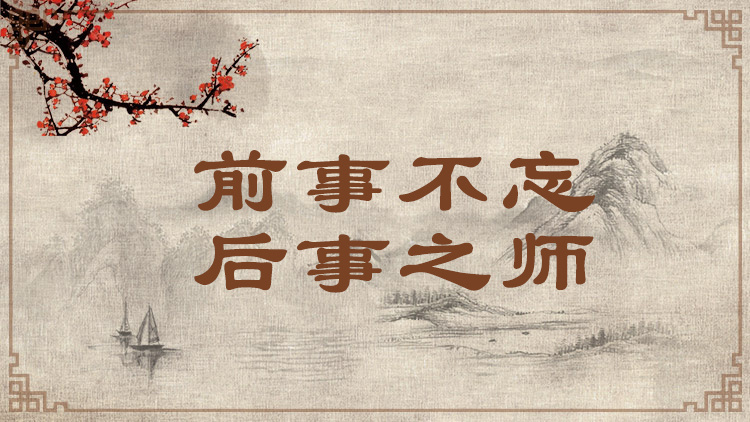前事不忘,后事之师
Past Experience, If Not Forgotten, Is a Guide for the Future

过去的事情不能忘记,它可作为以后行事的借鉴。“前事”即过去的事,亦即历史;“后事”即后来的事,亦即现在和未来;“师”即效法、借鉴。其深层含义在于提醒人们要从历史中吸取经验教训,以此作为后来的参照或借鉴。中国古代注重修史,史学空前发达,为的就是总结前代治国理政的成败得失,叙述历史人物特别是帝王与执政官员个人言行的是非善恶,对当代和后世起到警示与借鉴的作用。
This concept is meant to remind people of the need to learn from past experience and make it a guide for the future. In ancient China great importance was attached to writing history and thus historiography experienced great progress. It was designed so as to review the successes and failures of previous dynasties and recount the good and evil in historical figures, especially sovereigns and officials, in order to provide a warning or a guide for the future.
引例 Citations:
◎臣观成事,闻往古,天下之美同,臣主之权均之能美,未之有也。前事之不忘,后事之师。(《战国策·赵策一》)
我考察古往今来发生的事情,(发现)普天之下美的东西总是相同的,但臣下与君主权势均等而能和美相处的,(这种事情)从来也没出现过。过去的事情不能忘记,它可作为以后行事的借鉴。
In observing past events and learning of ancient times, I have found that the good things in the world are always the same, but it has never occurred that when a sovereign and his officials have had equal power, they can still live harmoniously. We should not forget past experience, but instead use it as a guide for the future. (Strategies of the Warring States)
◎又闻前事为后事之师,古人是今人之则,据其年代,虽即不同,量彼是非,必然无异。(赵普《上太宗请班师》)
又听说从前发生的事情是后人行事的借鉴,古人(的言行)可作为今人(言行)的准则,虽然事情发生的年代有不同,但考察其蕴含的是非道理一定不会有差异。
I have heard that past events are a guide to future events and that the words and actions of ancient people provide models for people of the present age. Even though time has changed, they are not off the mark in providing criteria for right and wrong. (Zhao Pu: Memorial Urging Emperor Taizong to Withdraw Troops)
推荐:教育部 国家语委
供稿:北京外国语大学 外语教学与研究出版社
责任编辑:钱耐安





